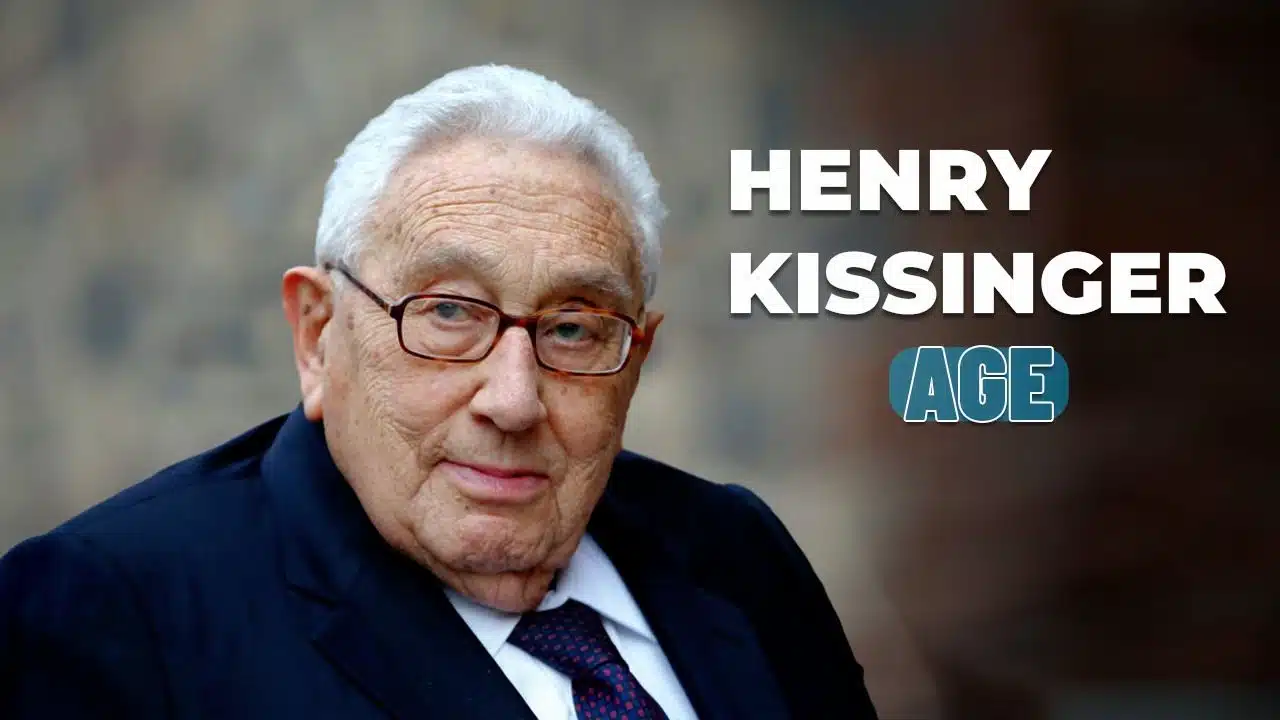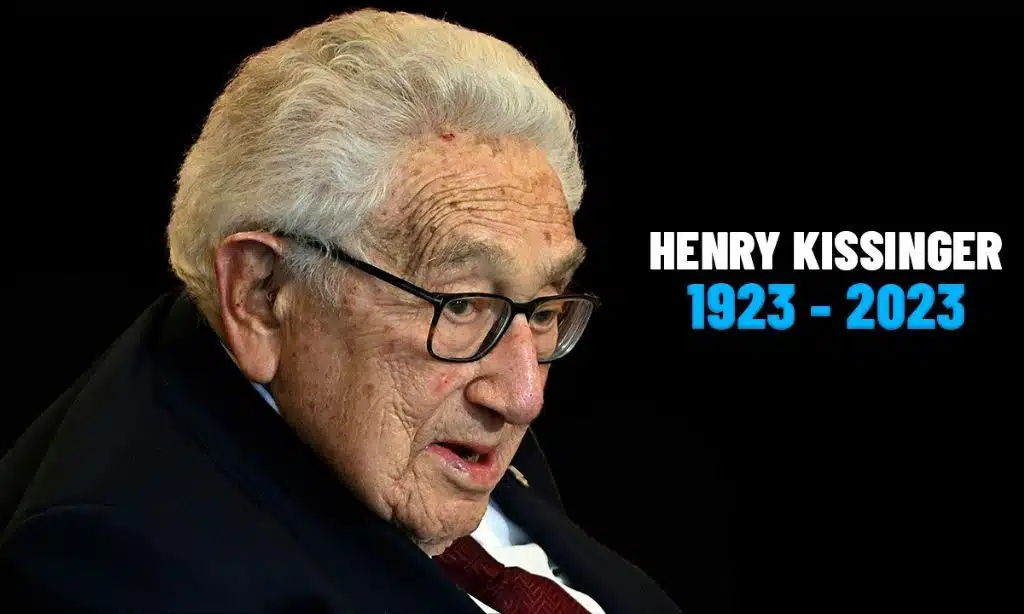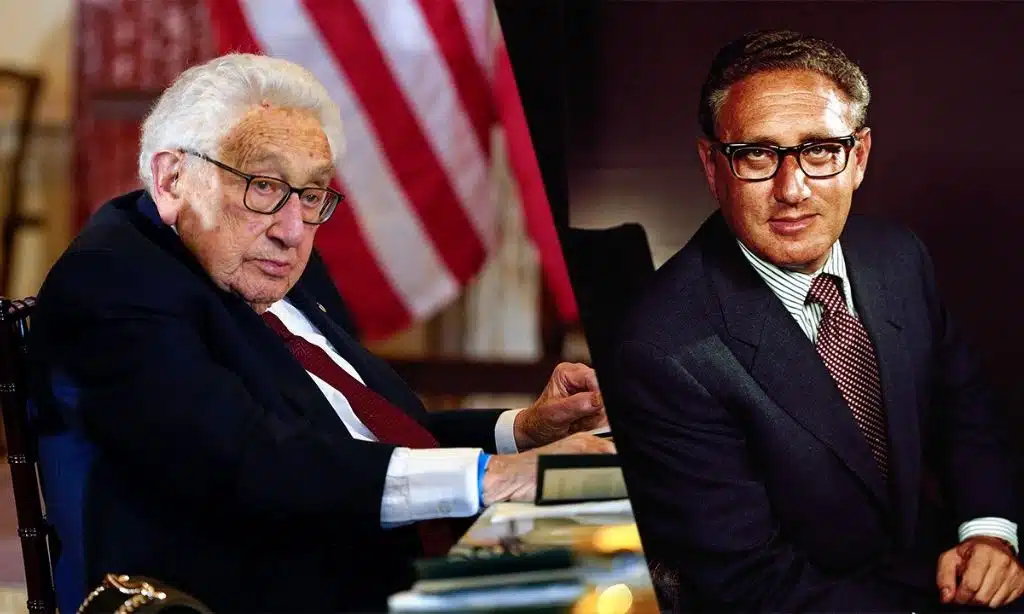Henry Kissinger, a name that resonates in the annals of history as an influential figure in global politics; born in Germany during the rise of Nazi power, he eventually fled to the United States and embarked on a journey that would shape the world for decades to come.
Kissinger passed away on November 29, 2023, at the age of 100.
Did you know that Henry Kissinger served as National Security Advisor and Secretary of State under President Richard Nixon and Gerald Ford? His diplomatic prowess and realpolitik approach significantly impacted U.S. foreign policy during a critical period in international relations.
In this blog post, we will delve into the life, career, controversies, legacy, personal life, and lasting impact of Henry Kissinger, a journey spanning 100 years that shaped global diplomacy and geopolitics.
Content Highlights
- Henry Kissinger, an influential figure in global politics, was born in Germany during the rise of Nazi power and later fled to the United States, where he became a U.S. citizen.
- He served as National Security Advisor and Secretary of State under Presidents Nixon and Ford, playing pivotal roles in shaping U.S. foreign policy during critical periods of international relations such as the Vietnam War and Cold War negotiations with China and Russia.
- Despite controversies surrounding his involvement in conflicts like Cambodia and Chile, Kissinger’s legacy continues to have a lasting impact on U.S. foreign policy, influencing American presidents and global diplomacy for decades after leaving government service.
Who is Henry Kissinger?
Heinz Alfred “Henry” Kissinger was a big name in world politics. Born in Germany, he had to leave because it was unsafe for Jewish people when the Nazis were in control. In 1938, his family moved to America, where they could live without fear.
He became an American citizen and helped the U.S. Army during World War II.
Kissinger is well-known for working hard to make peace between countries that were not getting along. He went from teaching at Harvard University to being a top helper for Presidents Richard Nixon and Gerald Ford.
As National Security Advisor and Secretary of State, he met with leaders from other places like China and Russia to stop fights and build friendships.
He got awards like the Nobel Peace Prize because he worked on important deals during tough times like the Vietnam War. After leaving government work, many presidents still asked him for advice on how to handle tricky situations around the world.
Henry Kissinger’s life shows how someone can start over in a new country, become a powerful leader, and try to bring peace in hard times.
Henry Kissinger Age: 100 Years
- He was born on May 27, 1923, in Fürth, Germany
- He moved to the United States in 1938 at the age of 15 to flee Nazi persecution (his family was Jewish)
- He became National Security Advisor in 1969 at the age of 46 during the Nixon administration.
- He then served as Secretary of State from 1973-1977 during Nixon and Ford’s administrations, aged 50-56
- After leaving political office post-Ford, he founded consulting firms like Kissinger Associates to continue advising foreign governments, beginning around his early 60s
- He has been an active author, speaker, and commentator on geopolitics and foreign affairs ever since, continuing into his 90s
- Henry Kissinger passed away on November 29, 2023, at the age of 100
Early life and education
Henry Kissinger was born Heinz Alfred Kissinger on May 27, 1923, in Fürth, Germany. Growing up in the midst of the turmoil surrounding World War II and the rise of Nazi Germany, his family fled to the United States in 1938 to escape persecution as Jewish individuals.
Settling in New York City, Kissinger attended George Washington High School before pursuing higher education at City College of New York. His early life experiences would greatly shape his perspectives and influence his future career path in foreign relations and diplomacy.
Childhood in Nazi Germany
Growing up in Germany in the 1930s was tough for young Jewish kids like Heinz Alfred Kissinger. Born in 1923, he faced a lot of hate because people did not like Jews at that time. It was scary, especially on nights like Kristallnacht when Jewish stores and homes were smashed.
Heinz’s family knew they had to leave to be safe. In 1938, they got away from Nazi Germany and moved to the United States. This move changed young Heinz’s life forever and led him on a path far different from what he might have imagined growing up under such harsh conditions.
He started fresh with his new American name, Henry Kissinger.
Immigration to the United States
Henry Kissinger was just 15 when he left Germany to escape the Nazis. He and his Jewish family found a new home in New York City. Life in America was not easy at first. Henry worked hard making brushes by day and learned English by night.
In 1943, Kissinger became an American citizen. This big step marked a fresh start for him. Soon after, he joined the U.S. Army to fight in World War II. His choice to serve showed his dedication to his adopted country, starting a journey that would lead him to history’s pages as an important public figure.
Career in Public Service
Henry Kissinger’s career in public service started with his military service in the U.S. Army and continued with an illustrious academic career at Harvard. He went on to be appointed as National Security Advisor, playing a pivotal role in shaping foreign policy and diplomacy during some of the most critical moments in U.S. history.
Military service in the U.S. Army
Henry Kissinger stepped into a big role in the U.S. Army not long after his 19th birthday. He became an American citizen in 1943, during a tough time of war. In the Army, he didn’t just fight; he also used his smarts to help catch bad guys from the Gestapo with good tips from informants.
This smart work got him a Bronze Star, showing that bravery isn’t always about how well you fight but also how well you think.
He worked hard in the Army’s counterintelligence unit and helped make things safer for others. This was just one part of his long journey serving his new country, which led him to even bigger places later on.
Academic career at Harvard
After his military service, Henry Kissinger pursued an academic career at Harvard. He completed his doctorate in 1954 and subsequently joined the faculty in 1957. Notably, Kissinger was named the associate director of Harvard’s Department of Government and Center for International Affairs.
His tenure at Harvard marked a significant period of academic contribution and influence.
Throughout his time at Harvard, Kissinger made substantial scholarly contributions and played a pivotal role in shaping international relations discourse. His expertise and leadership at Harvard laid the foundation for his subsequent influential roles in public service, particularly in the realm of foreign policy and diplomacy.
Appointment as National Security Advisor
In 1968, President Nixon selected Henry Kissinger as his national security adviser. This appointment marked the beginning of Kissinger’s influential role in shaping U.S. foreign policy.
Serving under two presidents, he played a pivotal role in navigating diplomatic relations during the Cold War and beyond. His stint as national security advisor laid the groundwork for his later tenure as secretary of state, cementing his impact on U.S. international affairs.
Role in foreign policy and diplomacy
After his appointment as National Security Advisor, Henry Kissinger played a significant role in reshaping the direction of the Cold War through negotiations with the Soviet Union and China.
His realpolitik approach and secret diplomacy helped thaw U.S. relations with China and achieve détente with the Soviets, altering the geopolitical landscape significantly.
Moreover, Kissinger’s involvement in talks aimed at ending the Vietnam War led to his being awarded the Nobel Peace Prize in 1973. This recognition underscores his pivotal role in shaping American foreign policy during a critical period of global history.
Controversies and Legacy
Kissinger’s policies have been subject to criticism, particularly for his involvement in the Vietnam War and support of anti-communist dictatorships. His legacy has sparked debate regarding his impact on U.S. foreign relations and the ethical implications of his diplomatic actions.
Criticisms of Kissinger’s policies
Kissinger faced criticism for his involvement in conflicts such as the U.S. carpet-bombing of Cambodia, undermining a democratically elected government in Chile, and supporting Pakistan’s dictator.
His Nobel Peace Prize, awarded jointly to North Vietnam’s Le Duc Tho, was controversial, leading to resignations from the Nobel committee. Kissinger authorized a secret carpet-bombing campaign in Cambodia during the Vietnam War, leading to severe criticism and allegations of war crimes.
He feared a successful Marxist government in Chile could set an insidious precedent, leading him to support the military coup that overthrew democratically elected president Salvador Allende in 1973.
Public perception and impact on U.S. foreign relations
Henry Kissinger’s involvement in conflicts like the U.S. carpet-bombing of Cambodia, undermining a democratically elected government in Chile, and supporting Pakistan’s dictator are notable for their controversy and criticism.
Despite his achievements, Kissinger faced backlash for backing anti-communist dictatorships in Latin America.
The Nobel Peace Prize awarded to Kissinger was contentious due to his role in these conflicts, leading to resignation from the Nobel committee. Post-office actions that commercialized his foreign policy views have also tarnished his reputation, according to some critics.
These controversies have left a lasting impact on how he is perceived and have affected U.S. relations with other countries. Additionally, you can also read about- Nobel Prize History: A Celebration of Human Excellence [Detail Guide]
Nobel Peace Prize and other notable awards
Henry Kissinger was honored with the Nobel Peace Prize in 1973 for his significant role in negotiations to end the Vietnam War. Alongside North Vietnam’s Le Duc Tho, this joint award stirred controversy and led to resignations from the Nobel committee.
In addition to the prestigious Nobel Peace Prize, Henry Kissinger received recognition through awards like the Presidential Medal of Freedom and the Medal of Liberty, highlighting his influential contributions to U.S. foreign policy.
Moving forward, let’s delve into Henry Kissinger’s personal life and death.
Personal life and death
Despite his influential career in public service, Henry Kissinger also had a rich personal life outside of politics. He was known to be an avid reader and enjoyed playing classical piano.
His passing at the age of 100 sparked reflections on his complex legacy and the impact he left on U.S. foreign relations.
Family and personal relationships
Henry Kissinger was married twice, first to Ann Fleischer in 1949 and then to Nancy Maginnes in 1974. He had two children, Elizabeth and David, from his first marriage. Kissinger’s family fled Nazi Germany in 1938, and he resettled in New York City, where he worked in a shaving brush factory and attended night classes.
Activities and interests outside of politics
Henry Kissinger, beyond his political career, remained an avid scholar and actively engaged in public speaking engagements. He taught at various universities and continued writing books on international relations.
Additionally, he launched an international consulting group to provide strategic advice to world leaders, ensuring his lasting impact outside the realm of politics.
His interests extended beyond traditional roles as he delved into technological advancements by showcasing a keen interest in artificial intelligence. Furthermore, Kissinger also took part in philanthropic endeavors and was known for his love of classical music.
These varied pursuits exemplify his multifaceted personality and broad range of passions.
Reflection on Kissinger’s legacy after his passing
Henry Kissinger passed away at the age of 100, leaving behind a controversial legacy in U.S. foreign policy. While some remember him as a skilled diplomat and strategist, others criticize his policies and post-government activities, which have tarnished his reputation.
Despite his passing, Kissinger’s influence continues to spark debates about the impact of his decisions on international relations. His death has reignited discussions about the balance between realpolitik and morality in foreign affairs, prompting reflections on how his legacy will shape future diplomatic endeavors.
Moving forward, an exploration of Henry Kissinger’s early life and education provides insights into how he navigated challenging circumstances to emerge as a prominent figure in global politics.
Takeaway
In conclusion, Henry Kissinger’s century-long journey has left an indelible mark on global diplomacy and foreign policy. His realpolitik approach and secret diplomacy reshaped U.S. relations with China and played a pivotal role in thawing the Cold War.
However, controversies surround his involvement in conflicts such as those in Cambodia and Chile, casting shadows over his legacy. Despite criticism, Kissinger’s influence remained prominent even after leaving government service, impacting American presidents and foreign policy circles for decades to come.
As we reflect on his influential journey of 100 years, it prompts us to consider the complex interplay between power, politics, and peace in shaping the world stage.
Frequently Asked Questions (FAQs)
Want to know more about Henry Kissinger? Check all the answers below.
1. What is Henry Kissinger most famous for?
Kissinger had a significant role in U.S. military actions in Cambodia during the Vietnam War, resulting in the loss of many innocent lives and contributing to the emergence of the Khmer Rouge regime. In addition, he was honored with a Nobel Peace Prize in 1973 for his significant contributions to the negotiations that sought to bring an end to the Vietnam War.
2. What did Henry Kissinger do during the Vietnam War?
His contributions were instrumental in the Paris Peace Talks, which ultimately resulted in the Paris Peace Accords. He played a crucial role in seeking resolutions to bring an end to the conflict with North Vietnamese and Viet Cong forces.
3. Was Henry Kissinger involved in other parts of the world?
Absolutely! He engaged in shuttle diplomacy to promote peace in the Middle East following the Yom Kippur War and held discussions on arms control with Leonid Brezhnev of Russia.
4. Has Henry Kissinger won any awards for his work?
Yes, he definitely has! He was honored with a National Book Award for his insightful work on nuclear weapons. Additionally, he authored “Diplomacy,” a thought-provoking book that delves into U.S.-China relations and other important topics.
5. Did people ever criticize what Henry Kissinger did?
Christopher Hitchens and others voiced their criticism, arguing that his decisions had negative consequences for human rights in countries such as Cambodia and Chile.
6. Why do we still talk about Henry Kissinger today?
Despite his advanced age of 100 years, he is widely regarded as a prominent figure due to his significant contributions to shaping America’s global behavior.
7. Did Henry Kissinger fight in World War II?
Following his family’s immigration to the United States, Henry Kissinger joined the U.S. Army.
8. Where did Kissinger die?
According to a statement from Kissinger Associates Inc., his geopolitical consulting firm, Kissinger passed away at his home in Connecticut. The circumstances were not mentioned. The announcement stated that he would be laid to rest in a private family service, with a public memorial service in New York City to be held at a later date.










































